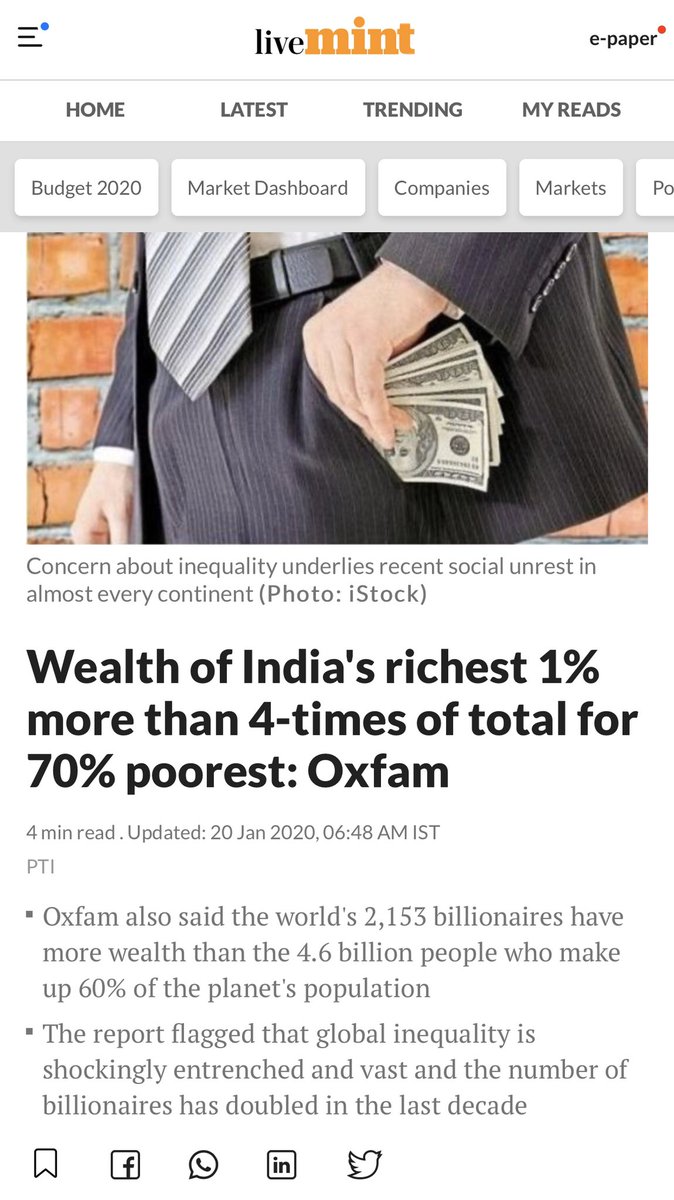This is the reason Modi doesn't want us to know who funds the BJP. The whole electoral bond scheme is opaque and points to a collusion between BJP and those who have become richer as a majority of Indians become poorer.
New Delhi: The Supreme Court’s decision to not grant an interim stay on the electoral bonds scheme has not gone down well with transparency activists, who said the move would prevent voters from knowing who is funding the political parties in elections that are scheduled soon and are expected later this year.
Taking up the plea challenging the electoral bonds scheme, a bench of Chief Justice S.A. Bobde and Justices B.R. Gavai and Surya Kant, on Monday asked the Centre and the Election Commission for their responses. It, however, did not grant an interim stay on the electoral bonds scheme, which the petitioners, Association for Democratic Reforms (ADR), had sought.
The Centre and the EC are required to file their responses within two weeks.
Also Read: SC Refuses to Grant Interim Stay on Electoral Bonds, Seeks Response From Centre, EC
Appearing for the petitioners, senior advocate Prashant Bhushan contended that the scheme was being used to channelise unaccounted black money to the ruling party. He also referred to a document of the Reserve Bank of India (RBI) in this regard. However, the apex court said it would see the document when the matter would come up for hearing after two weeks.
On behalf of the EC, senior advocate Rakesh Dwivedi requested that four weeks’ time be granted to file a reply.
Writing in The Wire, founder of ADR Jagdeep S. Chhokar had previously noted that several provisions made by the government in the electoral bonds scheme make it impossible for political parties to provide information about the donors.
A case in point, he had noted, was para 7(4) of the notification issued by the Ministry of Finance on January 02, 2018, which said: “The information furnished by the buyer shall be treated confidential by the authorised bank and shall not be disclosed to any authority for any purposes, except when demanded by a competent court or upon registration of criminal case by any law enforcement agency.”
Meanwhile, an immediate impact of the court order would be felt on the Delhi assembly elections, for which the Centre has begun the sale of electoral bonds for ten days.
The electoral bonds scheme was notified on January 2, 2018. It provided for purchase of electoral bonds by any person, who is a citizen of India or incorporated or established in India. The scheme was meant to fund political parties registered under Section 29A of the Representation of the People Act, 1951 and which had secured not less than one per cent of votes polled in the last general election to the House of the People or the Legislative Assembly of the State.
Though the scheme provided that electoral bonds could only be encashed by an eligible political party through a bank account with an authorised bank, rights activists have all through raised questions regarding why it did not have a provision to make public the names of the donors.
Activists disappointed
Responding to the latest Supreme Court ruling, Anjali Bhardwaj of the National Campaign for People’s Right to Information said it was “disappointing” that the Supreme Court has refused to stay the “opaque” electoral bonds scheme.
She said, “Information obtained under the RTI Act had revealed that the government pushed through the scheme despite serious objections raised by the Election Commission of India (ECI) and the Reserve Bank of India (RBI).”
Elaborating on this aspect, she said, the then-governor of the RBI, Urijit Patel, had flagged that the EB scheme carried a high risk of money laundering, forgery and counterfeiting. “The ECI had termed it a ‘retrograde step for transparency’. The information obtained also showed that after holding a briefing with the Prime Minister on the EB Scheme, the proposal for seeking views of political parties and members of the public was dropped.”
Also Read: PMO Told Finance Ministry to Break Rules, Sell Electoral Bonds Before Assembly Polls: Report
She also added that more than Rs 6,000 crore has been raised by political parties through the scheme since January 2018. The has been the biggest beneficiary, Bhardwaj said.
She also noted that the State Bank of India has refused to divulge the names of those who purchased the electoral bonds under the RTI Act. Incidentally, this refusal pertains to all cases of donations of Rs 1 crore or more.
Former central information commissioner and transparency activist Shailesh Gandhi termed the Supreme Court’s disinclination to staying the scheme as an “unfortunate development”. “It is a scheme which even the layman understands is flawed. So ideally the court should stop it because not staying it means you allow it to continue.”
Meanwhile, reacting to an Oxfam report that said India’s richest 1% have wealth four times that of the poorest 70%, Communist Party of India (Marxist) general secretary Sitaram Yechury tweeted that this explained why the BJP wanted to keep the electoral bonds scheme opaque.
(With inputs from PTI)




